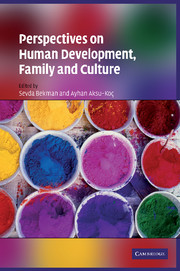Book contents
- Frontmatter
- Contents
- List of figures
- List of tables
- List of contributors
- Preface
- Foreword
- Selected international publications by Çiğdem Kağıtçıbaşı
- I Cultural and cross-cultural psychology: selected perspectives
- II Development in the family context
- III Culture and self
- IV Social change, family, and gender
- V Induced change
- 18 Adapting intervention programs for use across societies: Between valid transfer and cultural imposition
- 19 Design of culturally-appropriate developmental interventions
- 20 Designing, implementing, sustaining, and evaluating idiocultures for learning and development: The case study of the Fifth Dimension
- 21 Intervention programs to improve cognitive skills
- 22 Pro-poor approaches to using technology for human development: Monitoring and evaluation perspectives
- Epilogue
- Subject Index
- Author Index
- References
22 - Pro-poor approaches to using technology for human development: Monitoring and evaluation perspectives
Published online by Cambridge University Press: 04 August 2010
- Frontmatter
- Contents
- List of figures
- List of tables
- List of contributors
- Preface
- Foreword
- Selected international publications by Çiğdem Kağıtçıbaşı
- I Cultural and cross-cultural psychology: selected perspectives
- II Development in the family context
- III Culture and self
- IV Social change, family, and gender
- V Induced change
- 18 Adapting intervention programs for use across societies: Between valid transfer and cultural imposition
- 19 Design of culturally-appropriate developmental interventions
- 20 Designing, implementing, sustaining, and evaluating idiocultures for learning and development: The case study of the Fifth Dimension
- 21 Intervention programs to improve cognitive skills
- 22 Pro-poor approaches to using technology for human development: Monitoring and evaluation perspectives
- Epilogue
- Subject Index
- Author Index
- References
Summary
I am pleased to be able contribute a chapter to this volume that honors the work of Çiğdem Kağıtçıbaşı. In my view, Dr. Kağıtçıbaşı's work is unique in that it approaches, in significant and creative ways, the intersection of the science of human development with the potential of practical benefits for children and families. This may sound easy, and even obvious – but it is not. The field of child and human development has often evidenced a high though largely imperceptible wall between science and practice. That wall is even higher when cultural and international perspectives are taken into account. That is, when cross-cultural and cross-national dimensions of any phenomenon are taken into consideration, it is most often to confirm (or deny) the validity of some “universal” theory. Kağıtçıbaşı is one of the few scholars who has not only drawn our attention to the ethnocentric nature of simplistic theory-testing, but has tried, in her seminal work, to promote bridges that will translate theory into the practice (and vice versa) of improving children's lives. She has charted new ground consistently on a professional voyage that has allowed her to become one of the most recognized of development psychologists worldwide – which she richly deserves. The present chapter picks up on one of Kağıtçıbaşı's continuing themes, namely, that of how to meet the needs of poor children and youth, and understand impacts derived from interventions.
- Type
- Chapter
- Information
- Perspectives on Human Development, Family, and Culture , pp. 367 - 380Publisher: Cambridge University PressPrint publication year: 2009
References
- 1
- Cited by



